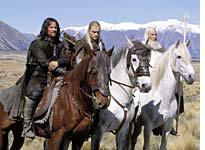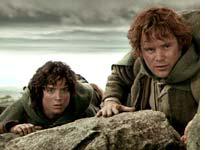In The Lord of the Rings:The Two Towers (New Line), the director Peter Jackson doesn’t bother with niceties like a beginning or an ending: No doubt aware that his audience has already seen The Fellowship of the Ring (2001) and bought its tickets for The Return of the King (2003), he serves up a big fat three-hour middle. The installment opens with Gandalf the Grey (Ian McKellen) in midfight with that giant spawn-of-hell Balrog, then picks up three plotlines in midstream. Hobbits Frodo (Elijah Wood) and Samwise (Sean Astin) make their way to Mordor with the cursed Ring of the Dark Lord Sauron, dogged by the seething, chattering gargoyle Gollum. Hobbits Merry (Dominic Monaghan) and Pippin (Billy Boyd) struggle first with the Uruk-Hai and then with the Ents, a race of walking, talking, often complaining trees. And Aragorn (Viggo Mortensen), Legolas (Orlando Bloom), and the dwarf Gimli (John Rhys-Davies) join forces with the Rohan, whose king, Theoden (Bernard Hill), is in the thrall of Gríma Wormtongue (Brad Dourif), a creepy little henchman of the dastardly Saruman the White (Christopher Lee). (If I have misspelled or mischaracterized any of the above, please send corrections to eatme@Idontgiveashit.com.)
As my synopsis implies, The Two Towers starts with a hash of exposition, the characters are sketchy, there’s no payoff, and the cross-cutting among the three separate plots kills whatever momentum the filmmakers manage to build. Two-thirds of the movie is battle scenes you can’t quite follow, although you can tell that a lot of people (or elves, or Uruks) won’t be rising from the blood-soaked ground, and those that do will be hitting the Advil bottle (or its Middle Earth equivalent) pretty hard. The film is, by most criteria, an ungainly piece of storytelling. Yet it sweeps you up and hurtles you along like water from an exploded dike. If it’s hard to keep hold of the spiraling narrative threads, it’s harder still to resist the rush of mythic imagery and cornball heroic dialogue delivered by gorgeously blue-eyed actors and actresses. Like its predecessor, Jackson’s movie infuses the solemn mock-scholarship of Tolkien with the volcanic enthusiasm of Tolkienites. The movie is a monument to a talented fan-boy’s passion: You emerge into the light with your heart pounding, ears ringing, head swimming, and gasp, “That’s entertainment!”

Is this one qualitatively different? No, it’s just as stirring: What I wrote in praise of The Fellowship of the Ring last December still applies. (It’s too bad that review is attached to what in retrospect seems a way-too-forgiving take on A Beautiful Mind.) The Two Towers is medieval sword-and-sorcery filtered through the sensibility of a brilliant visceral-horror maven (not, as Chris Suellentrop has argued, a schlockmeister—that would be the guy who made A Beautiful Mind). The viscera, in this case, is from the Earth itself, which is always belching up large, mucky things: snakes, marsh demons, Ringwraiths. Last time out, we heard Saruman command his ghoulish minions to rrrrrip the trees from the ground. Now we learn that his ferocious anti-environmentalism will have unforeseen consequences—that the forces of nature itself will join with hobbits, humans, elves, and such-like to forestall the resurrection of Sauron.
Mortensen’s Aragon and the creature Gollum get the most to do in The Two Towers. The former disembowels countless Uruks, has a spectacular battle with a marauding giant pig-creature, goes over a cliff, and gets bathed in the ardor of the dishy Rohan princess Éowyn (Miranda Otto)—the happiest addition to the Rings saga, especially given Cate Blanchett’s mere minute or so of screen time. Despite a slight resemblance to the Crypt Keeper from TV’s Tales From the Crypt, the schizoid Gollum is one of the most fascinating of all FX creatures—a twitchy, agonized (and agonizing-to-watch) combination of obsequiousness and hostility. He’s much more compelling than either McKellen or Lee—although the former has a nice moment when he declaims to Mortensen, “Look to my coming on the first light of the fifth day. At dawn, look to the east!” and then gives a little shrug of weariness, as if to say, “What the hell have I let myself in for?” I’ll probably give the same little shrug when I go off to The Return of the King next year—but I’ll plunge in just the same. I didn’t learn all these damn names to be deprived of a big finale.
